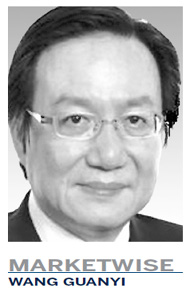Quantitative easing a form of currency intervention
Updated: 2010-10-20 06:58
By Wang Guanyi(HK Edition)
|
|||||||

The recent dispute in currency policies between export-oriented economies and developed economies can be traced back to the 2008 financial crisis. Developed economies have chosen to print money in order to claw the effects of the 2008 financial collapse.
Quantitative Easing (QE) was introduced in early 2009 by the central banks in hope to jump start their domestic economies. This helped restore confidence in the financial markets but never accomplished its purpose of boosting their own countries' economies. None of the G7 countries have been able to regain GDP growth close to that of pre-crisis levels. Hoping to boost business activity, central bankers printed money, but commercial banks were unwilling to lend, which resulted in massive liquidity directed elsewhere. Through the highly efficient network of investment banks, most of the extra liquidity injected indeed flew into the financial systems and once again boosted prices of various financial assets, while at the same time causing the US dollar to depreciate significantly over the past six months.
On the other hand, emerging market economies, which at one point relied heavily on exports, are suddenly witnessing significant appreciation pressure on their own currencies. Many of these economies acted, through tax or other forms of capital control, to maintain the stability of their own financial systems from the flooding of currencies such as the yen and the dollar. From the perspective of emerging economics, QE is a form of currency intervention, and a way of exporting inflation. The developed countries are trying to walk out from the gloom of deflation by transporting inflationary pressure on others through currency depreciation.
China has always been responsive and takes part in its fair share of global social responsibility. The country chose not to appreciate the yuan in the 1998 Asian crisis, which made life for all the Southeast Asian countries easier during the period. However, the impact and implications of further yuan appreciation on the country's 1.3 billion citizens will be drastic and must be handled carefully by the country's leaders. Because of the scale of such a move, China needs to consider all measures in handling the matter and this is an issue on which it will not easily give way.
Over the past two years, Beijing has worked hard to stimulate its domestic consumption in order to push GDP expansion and find other ways of continuing its economic growth without relying too heavily on exports. However, this is no easy task and such a change will take a longer time to implement in an economy as large as China's. Moreover, manufacturers in China are already pressured by surging labor and commodity costs. A rapid surge in the yuan will not only be catastrophic to exporters but could also lead to a huge surge in unemployment and subsequently social instability. On the other hand, if the yuan appreciates at a healthy pace, this would allow the restructuring of the Chinese economy to take place and the gradual transfer of wealth from exporters to households. Additionally, emerging Chinese consumers may eventually be able to provide employment opportunities to help alleviate western unemployment problems.
The Chinese Central Government clearly has a road map on internationalizing the yuan and ultimately making it a free-floating currency. However, the road map would clearly rely on when the infrastructure, legal framework, domestic banking and financial systems are ready. The actions from the Plaza Accord and the bitter lessons that the Japanese learned after appreciating the yen is well remembered. It might be in the interest of China to lend to the US for consuming more Chinese goods. It will never, however, be in the interest of China to jeopardize the well being of its manufacturers, to inflate property and stock markets with hot money, and to risk wiping out the wealth accumulated by hard working. Everyone knows that when hot money retreats, bubbles will burst and this is something China is taking very seriously.
The author is a visiting professor at the Asian International Open University, an international financial commentator at NOW business news channel and founder of www.wongsir.com.hk.
(HK Edition 10/20/2010 page2)